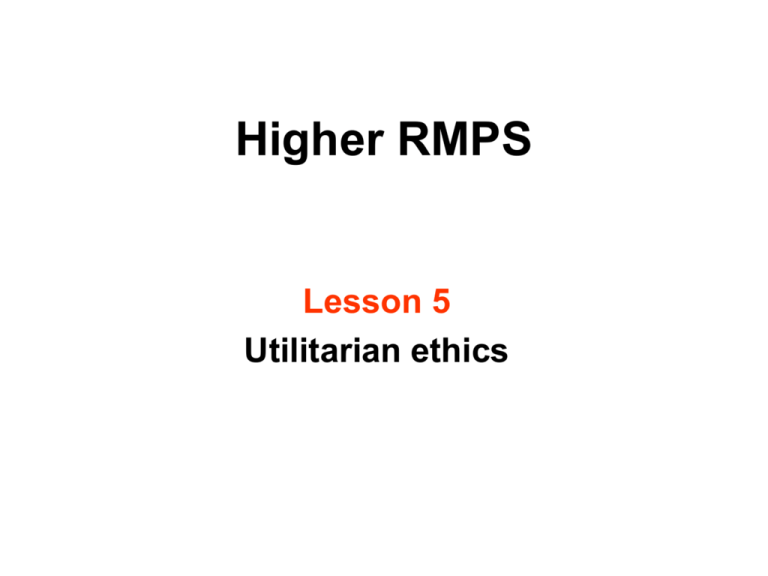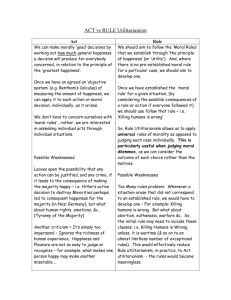Higher RMPS - Education Scotland
advertisement

Higher RMPS Lesson 5 Utilitarian ethics Learning intentions After today’s lesson you will be able to: • explain the guiding moral principle of utilitarianism • explain the two main types of utilitarianism • evaluate the utilitarian approach to making moral decisions. Utilitarianism The greatest happiness for the greatest number. The guiding principle in utilitarianism is that when you make a moral decision you should do what brings the greatest happiness or good to the greatest number of people. Utilitarianism is a based on maximising utility or happiness. A good act increases happiness or reduces pain. A bad act increases suffering or reduces happiness. Utilitarianism is a consequentialist ethical system, which means it is concerned with consequences. Two philosophers agreed we should seek happiness and avoid pain Jeremy Bentham Bentham’s utilitarianism was based on the outcome of actions. He said the correct action in any situation is the one that leads to the most happiness or the least pain. The more happiness caused, the better the moral act. John Stuart Mill Mill agreed with Bentham, but went one step further when he argued that utilitarianism doesn’t just take into account the quantity of happiness but also the quality of the happiness. Mill said there are higher and lower pleasures. The higher pleasure are those which people prefer over lower pleasures. For example, to have a good education would often be preferred over the lower pleasure of lying around all day doing nothing. There are two main types of utilitarianism Rule utilitarianism Many rules are made to ensure the greatest good for the greatest number, therefore following these rules is the right moral choice. For example, everyone obeys road traffic rules, like stopping at red lights, which makes the roads safer for everyone. Act utilitarianism This is based on the consequences of actions. If an action will lead to the greatest happiness for the greatest number of people then it is the correct moral action according to utilitarianism. For example, if 20 people were held hostage by four criminals, it would be correct for the police to kill the four criminals to save the 20 people. In other words, the greatest happiness for the greatest number of people. Now consider this scenario.. Imagine the following scenario. A prominent and much loved leader has been rushed to the hospital, grievously wounded by an assassin’s bullet. He needs a heart and lung transplant immediately to survive. No suitable donors are available, but there is a homeless person in the emergency room who is being kept alive on a respirator, who probably has only a few days to live, and who is a perfect donor. Without the transplant, the leader will die; the homeless person will die in a few days anyway. Security at the hospital is very well controlled. The transplant team could hasten the death of the homeless person and carry out the transplant without the public ever knowing that they killed the homeless person for his organs. What would a rule utilitarian do? What would an act utilitarian do? – For rule utilitarians, this is an easy choice. No one could approve a general rule that lets hospitals kill patients for their organs when they are going to die anyway. The consequences of adopting such a general rule would be highly negative and would certainly undermine public trust in the medical establishment. – For act utilitarians, the situation is more complex. If secrecy were guaranteed, the overall consequences might be such that in this particular instance greater utility is produced by hastening the death of the homeless person and using his organs for the transplant. Discussion points How do you think a utilitarian would respond in the following situations and why? You run an orphanage and have had a hard time making ends meet. A car dealership offers you a new van worth £15,000 for free if you will falsely report to the government that the dealership donated a van worth £30,000. You really need the van and it will give you an opportunity to make the children happy. Would a utilitarian agree to take the van? You are on a boat and nearby are two large rocks filled with people waiting to be rescued; there are five people on one rock and four on the other. Assume that you cannot rescue both groups and that you are the only one able to rescue either group. Which group would a utilitarian rescue? 30 people have been infected with a deadly disease which is very contagious and has no known cure. The health board have locked them in a room to keep them isolated from the rest of the community as they believe the disease will spread very quickly and kill large numbers of people if the infected people are released. The police have been called in to kill the 30 people and eradicate the risk of danger. Would a utilitarian agree with this action? Discussion points Now think again… You run an orphanage and have had a hard time making ends meet. A car dealership offers you a new van worth £15,000 for free if you will falsely report to the government that the dealership donated a van worth £30,000. You really need the van and it will give you an opportunity to make the children happy. A month after you agreed to take the van the authorities found out the truth about what had happened. They removed the van from the orphanage and sacked you because of the fraud. The orphanage was unable to find a replacement and has had to be closed down as a result. You are on a boat and nearby are two large rocks filled with people waiting to be rescued; there are five people on one rock and four on the other. Assume that you cannot rescue both groups and that you are the only one able to rescue either group. After you have rescued the group of five they begin to fight with each other about whose fault it was that they ended up stuck on a rock. As they argue it becomes clear that you have rescued a group of criminals who had been trying to steal a yacht from a family on holiday when it hit a rock and sunk. The group of four you didn’t save were that family. 30 people have been infected with a deadly disease which is very contagious and has no known cure. The health board have locked them in a room to keep them isolated from the rest of the community as they believe the disease will spread very quickly and kill large numbers of people if the infected people are released. The police have been called in to kill the 30 people and eradicate the risk of danger. The day after the 30 people had been wiped out to protect others a cure is found for the disease. Is morality really as simple as utilitarianism makes out? • Can we be held responsible for consequences we cannot always predict and that may be as a result of other people? • Can we really be expected to put aside our personal interests to always do what is best for the greatest number of people? • Are intentions not as important as consequences when making moral decisions? • Do utilitarians not leave moral decisions up to luck because we have to decide how to act and then wait to see what the consequences are to know if we have behaved in a morally correct manner or not? • Who decides what is right and wrong for the greatest number of people? Learning check… 1. 2. 3. 4. 5. 6. 7. 8. Explain utilitarianism in your own words. What does a consequential ethics system mean? How did the philosopher Bentham define utilitarianism? How did the philosopher Mill differ from Bentham in his view of utilitarianism? Define rule utilitarianism. Define act utilitarianism. Give two reasons why a person might support the utilitarian outlook on making moral decisions. Give two reason why a person might disagree with the utilitarian way of making moral decisions. 2KU 1KU 2KU 2KU 2KU 2KU 4AE 4AE Quick recap The guiding principle in utilitarianism is that when you make a moral decision you should do what brings the greatest happiness or good to the greatest number of people Rule utilitarianism: Many rules are made to ensure the greatest good for the greatest number, therefore following these rules is the right moral choice. Act utilitarianism is based on the consequences of actions. If an action will lead to the greatest happiness for the greatest number of people then it is the correct moral action according to utilitarianism. Bentham believes moral actions should based on the consequences of actions and should be made considering which consequence will have the greatest good for the greatest number of people. Mill argued that quality of happiness can be divided in high and lower pleasures.



